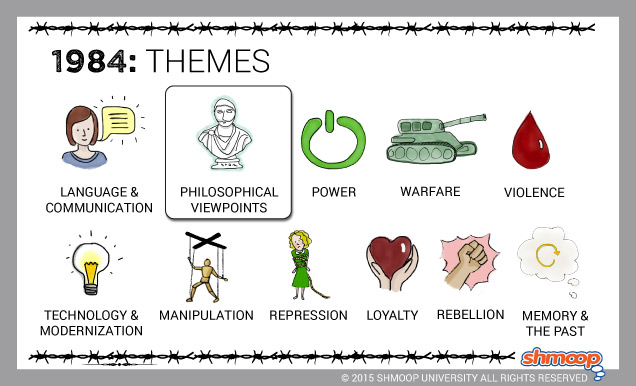 (Click the themes infographic to download.)
(Click the themes infographic to download.)
Have you ever noticed those stick figure family bumper stickers on the backs of minivans? You know, the ones with the rows of happy little stick figures, each one corresponding to one member of the family.
Yeah, those make us question the meaning of life, too.
You know what else makes us question the meaning of life? George Orwell.
In 1984, Winston endlessly contemplates the meaning of life, history, and power—and each one’s relation to the other.
And we don't blame him—after all, he did grow up under a crazy totalitarian government that watches his every move (even at home) and literally rewrites history. We can imagine how that might lead an inquisitive guy like Winston to question the very meaning of life, and question he does.
The book is full of existential ponderings and bold philosophical proclamations, many of which are often at odds. This makes for an exciting and challenging read—but it's no walk in the park.
Just like those cheesy stick figure families on the back of your mom's car, Orwell presents us with some heavy existential dilemmas. We can't say things turn out very great in the end, but you know what they say—getting there is half the fun.
Questions About Philosophical Viewpoints
- According to Ingsoc, the Party’s ideology, reality exists only in the mind of the individual. Do you believe an external reality exists independent of perception? If a tree falls in the forest and no one is around to hear it, does it make a sound?
- Is reality necessarily subjective for Winston? Can there ever be an objective account of history and its events in 1984, or is reality dependent upon the observer?
- Winston spends a lot of time ruminating on metaphysical questions, but no one else seems to be doing this at all. What is it about Winston that makes him different from his peers, that drives him to ask these philosophical questions?
Chew on This
Although Ingsoc preaches that reality exists only in the mind of the individual, objective reality exists insofar as it is possible to assess the collective minds of all the people – therein resides actuality, untainted by subjective perception.
It is necessary for the Party to control the past in order to control the present. However, it is not necessary to control the present in order to control the future.